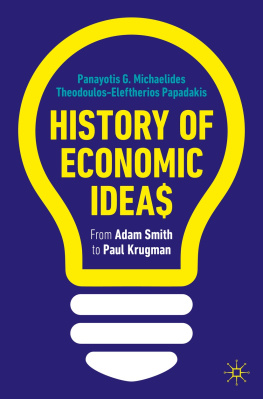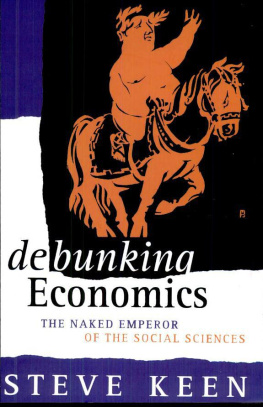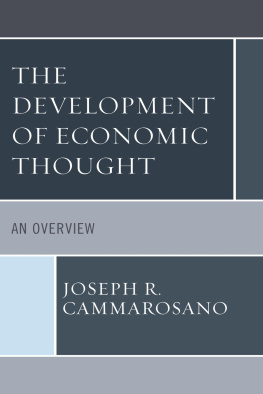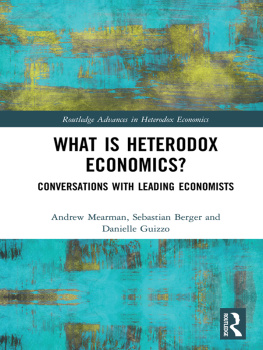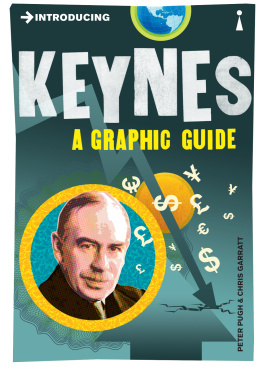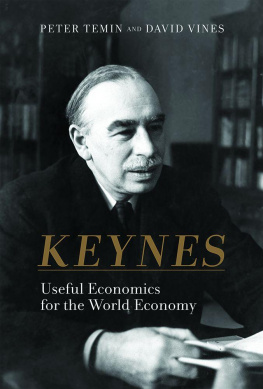A History of
Economic Thought
William J. Barber

Published by Wesleyan University Press, Middletown, CT 06459
www.wesleyan.edu/wespress
First Wesleyan edition 2009
William J. Barber, 1967
All rights reserved
Originally published by Penguin Books Ltd., 1967.
5 4 3 2 1
Library of Congress Control Number 67-100781
ISBNs for this edition:
ISBN-13: 978-0-8195-6938-7
ISBN-10: 0-8195-6938-0
The Library of Congress cataloged the original edition as follows:
Barber, William J.
A history of economic thought / William J. Barber
266 p. 19 cm.
Bibliography.
Includes index.
I. EconomicsHistory. I. Title.
HB75
330.15
Contents
Acknowledgements
My intellectual debts to those who have contributed, some of them unknowingly, to the shaping of this book are too heavy to enumerate in full. I wish particularly, however, to record obligations which date from student days in Oxford to a remarkable group of Balliol tutors: Paul Streeten, Thomas Balogh and Patrick Corbett. I should also like to express my thanks to three colleagues in Wesleyan Universitys College of Social Studies: E. O. Golob, L. O. Mink and E. J. Nell, who have read and commented on portions of the manuscript. None of the above should be incriminated for the shortcomings of the final product.
I wish to thank the following: Macmillan & Co Ltd, London, Harcourt, Brace and World, Inc, New York, and the trustees of the estate of the late Lord Keynes for permission to quote from John Maynard Keynes The General Theory of Employment, Interest and Money: Macmillan & Co Ltd, London, and Crowell-Collier and Macmillan Inc, New York, for permission to quote from Alfred Marshalls Principles of Economics and Money, Credit and Commerce.
W. J. B.
Prefatory Note
THIS study deals with the development of systematic economic ideas. It is not, however, intended as an inventory of the noteworthy contributions to economic discourse recorded throughout history. Nor, for that matter, does it purport to deal exhaustively with the thought of those writers whose works are discussed. Its objective is at once more limited and more ambitious: to inspect the properties of four distinct modes of economic reasoning developed in the past two centuries by considering the writings of representative contributors to these traditions.
Despite its ruthless selectivity, this procedure has much to recommend it. Each of the intellectual systems to be examined i.e., those of classical, Marxian, neo-classical, and Keynesian thought yield different insights into the nature of the economic universe and into the ways in which men can most effectively come to grips with it. The ideas they contain have long outlived their authors and have been adapted to deal with problems quite different from the ones which first prompted their formulation. Investigation of the properties of the major theoretical systems devised in the past thus has a perpetual relevance. Few things on this earth approach immortality so closely as a logically taut set of economic ideas.
The programme sketched above will, it is hoped, make a useful contribution to the readers appreciation of the nature and significance of the main analytical systems offered by the rich literature of economic theory. But it can provide no more than a beginning. Those who seek a fully satisfying grasp of economic analysis should grapple with its great minds at first hand. If this study can spur some of its readers to explore the classic works of economic theory in depth, its author will have been well rewarded.
Prologue
WHY should the history of economics be studied? A sceptic could marshal at least a superficially impressive array of arguments for assigning to any work of economic theory on which the copyright had expired the treatment Hume recommended for treatises on metaphysics: that they be consigned to the flames. Indeed, supporters of this position might be prepared to argue that the writings of dead economists are the repositories of outmoded doctrine, best forgotten lest error be perpetuated.
This line of challenge to historical studies is not limited to the discipline of economics. James Bryant Conant dealt with a similar problem when, as President of Harvard, he taught a course in the history of science. He did so, he confessed, with certain misgivings. If he succeeded in conveying to students how intelligent men could once support the theory of phlogiston with conviction, he might be doing a disservice to budding scientists. In this case he judged the gains from alerting the younger generation to their intellectual heritage to be more than sufficient to offset such risks.
A less militant challenge to the serious study of the past is now perhaps more pervasive. It can be plausibly argued that the concerns of the present call for all our intellectual energies and more. Resuscitating old works, though not necessarily harmful in itself, can be regarded as an expensive luxury. Whatever the intrinsic interest of the subject matter, it can be maintained that its systematic pursuit constitutes a misallocation of resources. It does not necessarily follow from this view that complete neglect of older theories is recommended. Certain proponents of this position would justify a place for the history of economic theory on the grounds that promising students can cut their teeth by exposing the errors of their ancestors.
One need neither venerate earlier economists nor be blind to their shortcomings to feel less than satisfied with this rationale for re-reading them. Such an attitude toward their work easily lends itself to caricatures of their thought and does less than justice to the analytical subtlety of the pioneers. And it may have another unfortunate effect. By implication, modern theories are treated as superior for all purposes to those worked out earlier. Economic analysis, to be sure, has made striking advances in the course of its evolution, particularly over the past two centuries. But to approach the literature that has contributed to this progress in a mood of self-congratulation imputes to current wisdom a quality of universal truth that does not augur well for the prospects for continued theoretical progress.
A strong case for perpetuating the historical study of economic thought can be made on humanistic grounds. Contact with the intellectual giants of the past yields its own rewards. The pure intellectual enjoyment it affords as well as its capacity to liberate the imagination from the parochialism of our own time and place requires no justification. This argument may be unanswerable. But, to a pragmatically-minded age, it is unlikely to be entirely convincing. Happily, explorations of older theoretical systems have more to offer to those for whom relevance to the present is an over-riding consideration. Many ideas of the past, for good or ill, live on and with consequences that touch the lives of all of us. The most distinguished economist of this century had this point in mind when he wrote:
... the ideas of economists and political philosophers, both when they are right and when they are wrong, are more powerful than is commonly understood. Indeed the world is ruled by little else. Practical men, who believe themselves to be quite exempt from any intellectual influences, are usually
A fuller appreciation of the modern world and of the ideas that have contributed to its shaping is not, however, the only practical dividend accruing from reflection on theoretical systems of the past. Anyone who seeks to penetrate beneath the surface of complex economic events requires a frame of reference within which the flux of economic life can be reduced to manageable proportions. Only with the aid of such an organizing framework can the world we observe be made intelligible. Otherwise, we lack a criterion for isolating the important from the unimportant influences on economic events.


